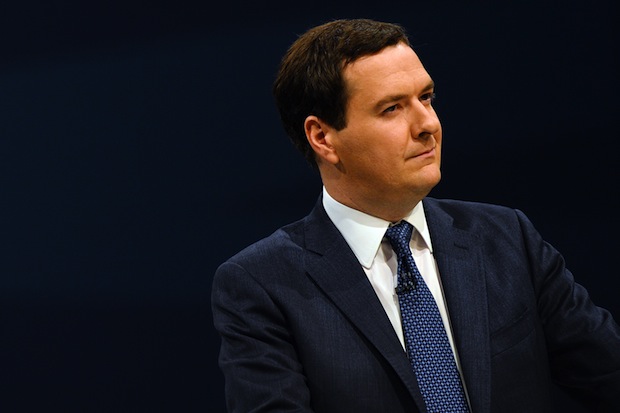In opposition, George Osborne said that you cannot borrow your way out of a debt crisis. In government, he has proved it. Since entering No. 11 Downing Street, his strategy has been to talk sternly about austerity while borrowing more than anyone else in Europe. With every budget he has presented, the deadline for balancing the books has slipped further forward — now it’s 2020. Britain’s AAA credit rating has gone, we’re paying billions more in debt interest payments as a result. The Chancellor has brilliantly spun all this as the problems of austerity rather than his own profligacy, but for three years he has had no good news to report. Until now.
The British economy seems to be springing back to life in a way no one predicted. Tax receipts are flooding into the Treasury twice as fast as expected. The International Monetary Fund has doubled its growth forecast for Britain. New orders for manufacturing are at levels not seen for 20 years, suggesting next year will prove an economic sprint. House prices are recovering quickly, and people are again borrowing on the back of their wealth. It would all be hugely encouraging, were it not for the lingering suspicion that this boom is as artificial as the last one.
There is an adage that a speculative bubble will occur as soon as the people who remember the last one have retired. Unfortunately, the rule does not seem to apply this time. Dangerously cheap loans, which induced the last bubble, are being pushed out as never before. The Chancellor’s Help to Buy mortgage subsidy scheme has become emblematic of his ongoing debt addiction. There is no reason to give artificial support to the housing market, since prices are still eye-wateringly high in many parts of the country. Yet the Treasury is offering interest-free loans to first-time buyers, increasing buying power and (ergo) house prices. The Treasury wins (stamp-duty receipts are up by a third) and Mr Osborne doubtless believes young voters will thank him. But he risks sowing the seeds of a new crash.
It will be a different crash. In the future, taxpayers will not need to bail out the banks: we will bear the losses directly. George Osborne says that the Bank of England will keep a careful eye on things to ensure there is not a bubble, which suggests he has not learnt the main lesson from the last crash: central banks cannot identify a bubble until after it has burst. What we do now know is that banks are lending at negative interest rates: that is to say, they are paying people to borrow. To rob a bank these days, you don’t need a gun.
There is nothing wrong with a government promoting home-ownership. The Conservatives’ efforts to do this in the 1980s, through the right-to-buy and deregulation of the mortgage market, were brilliantly successful. It was part of a transformation of British society which saw people turn away from the state and become more self-reliant. But as was demonstrated in the US under George W. Bush, things can go badly wrong when mortgage markets are rigged and people are encouraged to take out risky loans. When the mortgage term comes to an end and repayments double, what then?
As long as the British economy is being fuelled by underpriced debt, it will be impossible to distinguish a recovery from another bubble. It is great news that car sales have grown for 19 months in a row, but unnerving that a record proportion (three in four) of those cars are being bought with borrowed money. It is not enough for the Chancellor artificially to inflate headline economic figures: we need a recovery we can believe in.
Leave us alone
David Cameron did not enter politics to end Britain’s tradition of a free press. He gave an admirable speech to the House of Commons pledging to defend it against statutory regulation. But he did say that the press needed to reform. The newspapers took his request on board, accepted almost all of Leveson’s recommendations — and now look set to be regulated more tightly than any other press corps in the free world.
At the same time, the politicians want to put themselves in charge of press regulation. The result is a fiasco. The first tawdry deal was stitched up by three parties in Ed Miliband’s office at 3a.m. Then the politicians tried to go through the Privy Council, pretending that the presence of the Queen at the meeting somehow meant that it was not political. A cabal of MPs within the Council have now rejected press freedom, and there is talk of the press being forced to sign up.
The Spectator can offer this assurance: we will play no part in the state licensing of the press. This week we have heard MPs say how keen they are to ‘protect’ the press. Soon, the coalition will be drawing up a British Bill of Rights. It ought to enshrine press freedom, offering the same protections as Americans are offered by the First Amendment. Our politicians must leave the press alone.
Got something to add? Join the discussion and comment below.
Get 10 issues for just $10
Subscribe to The Spectator Australia today for the next 10 magazine issues, plus full online access, for just $10.
You might disagree with half of it, but you’ll enjoy reading all of it. Try your first month for free, then just $2 a week for the remainder of your first year.














Comments
Don't miss out
Join the conversation with other Spectator Australia readers. Subscribe to leave a comment.
SUBSCRIBEAlready a subscriber? Log in